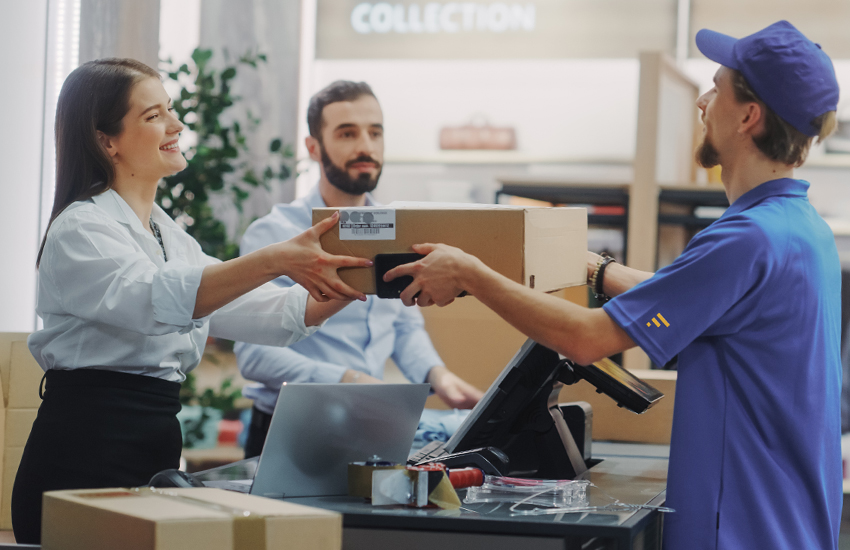
A global pandemic sent consumers in search of alternative shopping and delivery experiences. Store visits plummeted. Online sales boomed. And leading retailers responded to demand by filling orders in multiple ways – most commonly, multichannel retail options ship-from-store, ship to store, buy-online-pickup-in-store (BOPIS), or curbside pickup.
While the current “new normal” brings shoppers back to brick-and-mortar mall locations, the convenience of online retail keeps the click counts high in the digital marketplace. Estimated U.S. retail ecommerce sales in Q2 2022 reached $257.8 billion, increasing 2.7% over Q1 and 6.8% over the same period in 2021. Ecommerce represented 14.5% of total sales during Q2.
At the same time, retail store operators are still navigating supply chain bullwhips. Many face inventory imbalances caused by shipping delays, stockpiling, and fluctuations in consumer demand. Focused on alleviating storeroom pressure, some retailers are selling out-of-season and excess products at discounted prices. That jeopardizes profit when consumer sentiment is uncertain ahead of the year-end holiday shopping season.
In this environment, an order fulfillment strategy that incorporates ship-from-store is essential. Ship-from-store allows retailers to capitalize on ecommerce and improve inventory management. At the same time, a well-executed ship-from-store strategy limits touches and transportation moves and builds loyalty among satisfied customers.
Ship-from-store (SFS) is a retail fulfillment strategy serving customers who place orders online or in-store. Instead of filling orders through a warehouse or distribution center, SFS allows retailers to leverage inventory positioned at store locations.
Store employees complete order fulfillment: picking products from inventory, packing orders for shipment, and executing transportation by private fleet or transportation service provider. Typically, the customer chooses delivery details based on their preferences for delivery speed, location, and additional services, such as set-up, installation, and refuse removal.
Ship-from-store became more prevalent when social distancing, closures, and quarantines disrupted consumer lives. During lockdown, consumers powered an ecommerce surge that drove a 33.2% uptick in online retail sales between 2019 and 2020. As those consumers demanded convenience while reducing store visits, U.S. mall-based retailers responded.
Our Coresight Research survey of 150 executives at mall-based retailers found that 77.3% offer multichannel options to customers. Of those respondents, nearly 40% offer SFS, but only 8% actually use their mall-based stores for online order fulfillment.
Multichannel fulfillment allows retailers to meet customer expectations, improve inventory utilization, and balance the surging ecommerce and brick-and-mortar retail channels.
With ship-from-store, retailers use existing store infrastructure to reduce reliance on distribution centers and warehouse space. In the process, by decentralizing inventory, retailers can move products closer to their final destinations and reduce costly last-mile transportation expenses.
Here’s a closer look at three benefits of ship-from-store:
Flexible order fulfillment: Customers expect fast delivery – sometimes next-day or even same-day. Ship-from-store allows retailers to skip distribution centers and reduce delivery time. SFS also eliminates bottlenecks when orders can’t be fulfilled in full directly from one location due to capacity, labor, technology, or inventory constraints.
Using multiple stores or storage locations as fulfillment centers enables retail shippers to identify the best product location to meet their customers' expectations. Retailers can also avoid lost sales on out-of-stock products when they can fill orders from any location.
Further, ship-from-store enables mall-based retailers to limit carbon emissions and waste by leveraging existing store space and optimizing transportation moves.
Not all retailers are equipped to execute ship-from-store effectively.
Many inline specialty stores aren’t typically built for fulfillment. They lack the storage, packing, and staging areas required to fulfill online orders repeatedly. Likewise, effective ship-from-store requires a single, accurate view of inventory across all locations – in real-time. Don’t forget, with an SFS strategy, employees at the store level are expected to execute picking, packing, and transportation procurement for each order.
Fillogic eliminates those constraints to power ship-from-store for retailers operating in malls and other locations. Our logistics-as-a-service platform converts under-utilized retail space into tech-enabled distribution hubs that bring retailers closer to their customers.
Fillogic’s real-time, two-way integrations with retail order management systems (OMS) enable expedited fulfillment. Online shoppers enjoy online visibility to shipments executed by Fillogic’s network of national, regional, and local carriers. And Fillogic’s employees do all the logistics work of order fulfillment so store employees can focus on selling.
With a frictionless Fillogic customer experience, retailers save up to 65% of their time and cost for store-based fulfillment.
Learn more about how Fillogic is reimagining retail and helping retailers compete with ecommerce behemoths in our new guide: “A Flight Plan to Successfully Navigate Retail Logistics.”

Copyright © 2026 R and B Supply Chain Inc. DBA Fillogic All Rights Reserved.